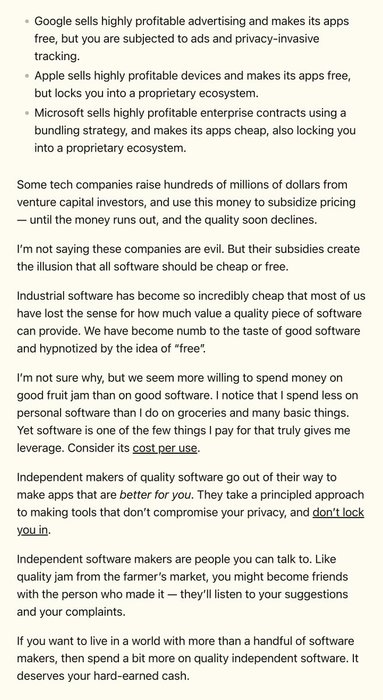

Saved by phoebe and
Quality software deserves your hard‑earned cash Quality software from independent makers is like quality food from the farmer’s market. A jar of handmade organic jam is not the same as mass-produced corn syrup-laden jam from the supermarket. Industrial fruit jam is filled with cheap ingredients and shelf stabilizers. Industrial software is filled with privacy-invasive trackers and proprietary formats. Google, Apple, and Microsoft make industrial software. Like industrial jam, industrial software has its benefits — it’s cheap, fairly reliable, widely available, and often gets the job done. Big tech companies earn hundreds of billions of dollars and employ hundreds of thousands of people. When they make a new app, they can market it to their billions of customers easily. They have unbeatable leverage over the cost of developing and maintaining their apps. Independent software makers are small teams that don’t have those economies of scale. They can try to compete on price by compromising their craft, or they can charge a fair price knowing this will drive a large number of people to choose big tech instead. Either way, big tech wins because they take a 20–30% cut of the app store money earned by most independent makers. A cost that the big tech companies do not incur. Big tech companies have the ability to make their software cheap by subsidizing costs in a variety of ways: - Google sells highly profitable advertising and makes its apps free, but you are subjected to ads and privacy-invasive tracking. - Apple sells highly profitable devices and makes its apps free, but locks you into a proprietary ecosystem. - Microsoft sells highly profitable enterprise contracts using a bundling strategy, and makes its apps cheap, also locking you into a proprietary ecosystem. Some tech companies raise hundreds of millions of dollars from venture capital investors, and use this money to subsidize pricing — until the money runs out, and the quality soon declines. I’m not saying these companies are evil. But their subsidies create the illusion that all software should be cheap or free. Industrial software has become so incredibly cheap that most of us have lost the sense for how much value a quality piece of software can provide. We have become numb to the taste of good software and hypnotized by the idea of “free”. I’m not sure why, but we seem more willing to spend money on good fruit jam than on good software. I notice that I spend less on personal software than I do on groceries and many basic things. Yet software is one of the few things I pay for that truly gives me leverage. Consider its cost per use. Independent makers of quality software go out of their way to make apps that are better for you. They take a principled approach to making tools that don’t compromise your privacy, and don’t lock you in. Independent software makers are people you can talk to. Like quality jam from the farmer’s market, you might become friends with the person who made it — they’ll listen to your suggestions and your complaints. If you want to live in a world with more than a handful of software makers, then spend a bit more on quality independent software. It deserves your hard-earned cash.


Saved by phoebe and

